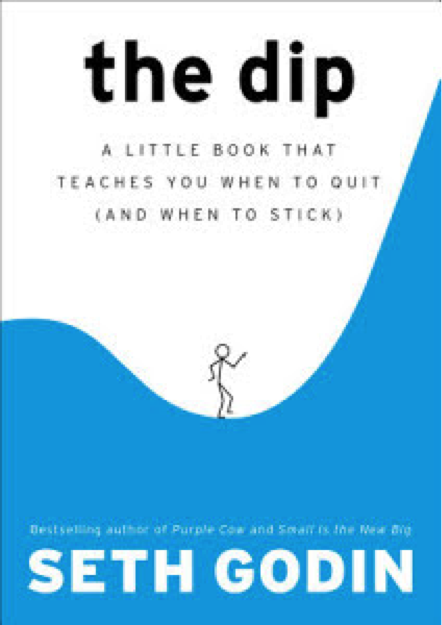The Dip is about being a quitter—or knowing when to become a quitter and when to hold on.
Never Give In
In the darkest days of World War II, when Great Britain stood alone in the face of Nazi dominance in 1941 (months before Pearl Harbor brought America into the fight), Churchill gave a short, 8-paragraph speech at his alma mater, Harrow. This is what we remember from his speech:
Never give in, never give in, never, never, never, never-in nothing, great or small, large or petty—never give in except to convictions of honour and good sense. Never yield to force; never yield to the apparently overwhelming might of the enemy.[i]
Well-Known Quitters
Few people are known for quitting. Yes, there are examples like Sarah Palin, Richard Nixon, and Edward VIII of England who abdicated the throne in 1936. My new favorite example of this kind of quitter is the Buffalo Bills’ Vontae Davis. It was the middle of a game. The score was 28-6 and his team was losing. Davis just walked off the field at half-time declaring himself “Retired.” The Bills lost 31-20.
Quitting doesn’t make you famous; More often than not, it makes you infamous.
Winners Never Quit
Most well-known people are well known because, in Churchill’s words, they didn’t give in. J.K. Rowling’s first Harry Potter novel was rejected by all the major publishing houses before it was published. Stephen King’s first novel was rejected 30 times before his big break. Jack Canfield and Mark Hansen’s Chicken Soup for the Soul was rejected an astonishing 144 times before it was published. It became a New York Times #1 Best Seller.[ii]
You have probably heard of the many offices that Lincoln lost before he became president. Lincoln lost a bid for the state house in 1832. He won the seat in 1834, but lost his bid for Speaker of the state legislature in 1838. He failed to achieve his party’s nomination for congress in 1843. He ran again in 1846 and won. In 1849, he sought a position as Commissioner of the General Land office, but he was denied. In 1854 he campaigned for the U.S. Senate and lost. In 1856, he was nominated for vice president, but he lost again. In 1858 he ran for the U.S. Senate and lost again. But in 1860, he won and became the 16th president of the United States.[iii]
You might not have thought that Donald Trump would win. He might not have thought he would win either, but he didn’t give up. He is now the president because he kept going even though the odds were stacked against him.
Quit
So, never give in, right? Godin counsels just the opposite. Winners never quit is bad advice. “Winners quit all the time. They just quit the right stuff at the right time.”[iv] He continued, “Believe it or not, quitting is often a great strategy, a smart way to manage your life and your career.”[v]
Before we get into the book, I would like you to take some time to think about when you should quit and when you should persevere. I will provide Godin’s insight next week, but take some time to think about this now.
What About You?
Should you persevere? Should you quit what you are doing? How do you know the difference?
______________

Dr. Darin Gerdes is a tenured Professor of Management in the College of Business at Charleston Southern University. All ideas expressed on www.daringerdes.com are his own.
This post was originally created for Great Business Networking (GBN), a networking organization for business professionals where Dr. Gerdes is the Director of Education.
______________
References
[i] Eclov, L. & Hills, V. (2003, January). Churchill’s real ‘never give up’ speech. Preaching Today. Retrieved from https://www.preachingtoday.com/illustrations/2003/january/14163.html
[ii] Temple, E. (2017, December 22). The most-rejected books of all time (of the ones that were eventually published). Lithub.com. Retrieved from https://lithub.com/the-most-rejected-books-of-all-time/
[iii] Mikkelson, D. (2000, 12 July). Abraham Lincoln and failure. Snopes.com. Retrieved from https://www.snopes.com/fact-check/abraham-lincoln-failure/
[iv] Godin, S. (2007). The dip: A little book that teaches you when to quit (and when to stick). New York: Portfolio. (p. 3).
[v] Godin, S. (2007). The dip: A little book that teaches you when to quit (and when to stick). New York: Portfolio. (p. 5)

